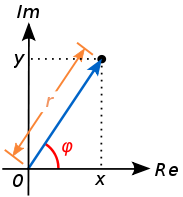The argument of a complex number.
 Evaluate
φ
=
a
r
g
[
cos
(
2
π
)
e
i
π
+
i
sin
(
2
i
π
)
]
where
φ
∈
(
−
π
,
π
]
.
Evaluate
φ
=
a
r
g
[
cos
(
2
π
)
e
i
π
+
i
sin
(
2
i
π
)
]
where
φ
∈
(
−
π
,
π
]
.
The answer is 3.1415.
This section requires Javascript.
You are seeing this because something didn't load right. We suggest you, (a) try
refreshing the page, (b) enabling javascript if it is disabled on your browser and,
finally, (c)
loading the
non-javascript version of this page
. We're sorry about the hassle.
2 solutions
Because cos 2 π = 0 , the real part evaluates to 0 . Taking ar g ( i sin ( 2 i π ) ) , we get π .
I stopped after calculating the real part, what is arg? @Finn Hulse
I'd like to add: i sin(2i(pi)) = - sinh(2(pi)) and since -sinh(2pi) is real, so arg = tan^(-1) (0/-sinh(2pi)) = pi = 3.14(approximate).
φ = ar g ( cos ( 2 π ) e i π + i sin ( 2 i π ) ) = ar g ( ( 0 ) e i π + i ⋅ 2 i e − 2 π − e 2 π ) ≈ ar g ( − 2 6 7 . 7 4 5 ) = ar g ( 2 6 7 . 7 4 5 e i π ) = π By Euler’s formula: e i θ = cos θ + i sin θ for φ ∈ ( − π , π ]